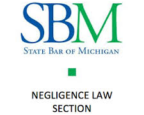
It’s something we all know can happen at any moment but never really think it will—untimely death. The death of a loved one has far-reaching impacts; the entire family can suffer. Suppose you have lost a beloved family member due to negligence or wrongful behavior. In that case, you are likely overcome with grief, anger, and confusion. Nothing will ever bring them back or make what happened somehow acceptable. However, in the event of negligence causing the fatality, there are legitimate reasons to hire a Michigan wrongful death attorney to file a lawsuit and secure justice for your loved one.
If you’ve been considering filing a wrongful death claim in Michigan, contact a Michigan wrongful death lawyer at Christensen Law for help.
Our Michigan Wrongful Death Attorneys at Christensen Law Represent Many Types of Cases
Many types of Michigan accidents can cause death. While we can proceed through life-balancing risk, ultimately, we can’t prevent every accident. And we cannot count on everyone else to be cautious and responsible, especially on the roads.
Often, a loved one was injured because of someone else’s wrongful actions, not because they did anything wrong. The cause of their death does play a role in the Michigan wrongful death claim you and your family file on their behalf. That’s because certain laws impact different types of accident claims in Michigan.
For example, if your loved one was killed in a car accident, then vehicle accident laws will apply to their wrongful death case. If your loved one was killed due to medical negligence, then medical negligence laws will apply in that case. Your wrongful death lawyer in Michigan will help you understand the laws that affect your case, and how to proceed.
Some examples of wrongful death accident types our personal injury lawyers represent in Michigan:
- Car accidents
- Construction accidents
- Pedestrian accidents
- Truck accidents
- Motorcycle accidents
- Premises liability accidents
- Dangerous products
- Animal attacks
Losing a loved one is shocking, especially when their death was caused by someone else’s carelessness or wrongful actions. At Christensen Law, our Michigan wrongful death attorneys are here to guide you through the legal process with compassion and expertise. We understand that each case is unique, and we’ll work tirelessly to help you seek justice.
Damages Our Michigan Wrongful Death Lawyers Could Obtain for You
One of the main reasons to file a wrongful death claim for a Michigan accident is to obtain financial compensation due to the family or estate of the deceased. Financial compensation is not intended to replace your lost loved one. What it does do is pay for the financial burdens associated with the accident and loss.
For instance, related medical bills could be covered through your wrongful death claim. If your lost loved one was the family’s financial provider, you could obtain compensation to help you deal with the loss of their income.
Your Michigan wrongful death attorney is focused on helping you obtain the money you need to get through this traumatic event. Some damages that could be covered through your wrongful death claim include:
- Pain and suffering of the deceased prior to death
- Lost income
- Funeral and burial costs
- Medical costs
- Grief and mental suffering
- Loss of consortium
Filing a wrongful death claim won’t bring your loved one back, but it can provide crucial financial relief during an incredibly challenging time. At Christensen Law, we are dedicated to helping families recover compensation for the costs and hardships caused by their loss, from medical bills and funeral expenses to emotional suffering and lost income. Our compassionate Michigan wrongful death attorneys are here to support you every step of the way, ensuring you have the resources needed to move forward while honoring your loved one’s memory.
What Are the Benefits of Filing a Michigan Wrongful Death Claim?
Although no amount of money will ever justify the negligent death of a loved one, a lawsuit could help you and your family considerably.
Some claims actually lead to changes in legislation or safety regulations, which could make the world a little safer for others. A successful case means you and your family could receive financial compensation to help you deal with this loss, money to pay for related financial budens, such as funeral and burial expenses. The money could even go to charity or organizations your lost loved one cared about, or into trust for family members.
Who Has the Right to File a Wrongful Death Claim in The Great Lakes State?
In Michigan, wrongful death lawsuits cannot be filed directly by a loved one. Instead, the case must be brought forward by the decedent’s personal representative, often referred to as an executor. This individual files the lawsuit on behalf of eligible beneficiaries who can claim compensation under Michigan law.
According to Michigan Compiled Laws § 600.2922, the following family members are typically eligible to receive wrongful death compensation:
- Spouses and children
- Siblings
- Parents
- Grandparents
- Stepchildren (children of the decedent’s spouse)
- Anyone named in the decedent’s will
If none of these beneficiaries are living or if the decedent left no will, others who are legally allowed to inherit from the estate, such as first cousins, aunts, and uncles, may qualify to receive damages.
After the executor initiates the lawsuit, Michigan law requires a 60-day period during which surviving family members or beneficiaries named in the will must report how the decedent’s death has impacted them financially. These submissions help determine the compensation amount the executor can pursue on their behalf.
At Christensen Law, our experienced Michigan wrongful death attorneys represent families across the state, including Detroit, Ann Arbor, Grand Rapids, Jackson, Warren, Royal Oak, Flint, Troy, Southfield, and beyond. We’re dedicated to ensuring that families receive the justice and financial support they need during this difficult time.
How Our Michigan Wrongful Death Legal Team Can Help You with Your Claim
Losing a family member because someone else’s recklessness is disturbing, and pursuing a wrongful death claim can feel overwhelming. That’s where our dedicated team at Christensen Law comes in. Here’s how we can help:
- Comprehensive case evaluation: We’ll review every detail of your case, ensuring no evidence is overlooked.
- Expert evidence gathering: Our team works with reconstruction specialists, medical professionals, and other experts to support your claim.
- Working with complex laws: Michigan wrongful death laws can be challenging to understand. We’ll guide you through every step, explaining how state-specific rules affect your case.
- Negotiating with insurance companies: Insurance companies often try to minimize payouts. We’ll handle all negotiations to pursue the full compensation you deserve.
- Trial-ready representation: If a fair settlement can’t be reached, we’re prepared to take your case to court and fight aggressively for justice.
We understand the financial and emotional burdens you’re facing. That’s why our team of wrongful death attorneys in our Michigan offices is committed to securing compensation for funeral expenses, medical bills, lost income, and the pain and suffering caused by your loss. Let us help you through this difficult time with compassionate and skilled legal representation.
Why Hire Christensen Law’s Michigan Wrongful Death Lawyers for Your Case
Choosing the right attorney to represent your wrongful death claim can make all the difference in achieving justice for your loved one. Here’s why families across Michigan trust Christensen Law to handle their most sensitive cases:
Proven Results in Successful Settlements and Verdicts
While every case is unique, our outstanding record demonstrates our dedication to each client.
- We secured a $9.5 million jury award for a victim who passed away after an underage employee failed to call 911 during a gas station stabbing.
- A $4.55 million jury award was achieved after a cable technician lost his life due to electrocution while working on a power pole, leaving behind a grieving wife and two young children.
- In another case, we obtained a $3.2 million settlement after a head-on collision caused life-altering injuries to a husband and claimed the life of his wife.
Contingency Fee Advantage
We work on a contingency fee basis, meaning you pay nothing upfront. We only receive payment if we win your case, eliminating financial risk for your family during this challenging time.
Compassionate Advocacy
Our team understands the emotional toll of losing a loved one. We provide compassionate, client-focused representation while aggressively fighting for the justice and compensation you deserve.
Statewide Legal Representation
From Adrian and Shelby to Macomb, Wyoming, and beyond, our Michigan personal injury lawyers are ready to help families throughout the Wolverine State.
Contact our team today if you’re wondering how much your wrongful death claim may be worth. We’ll carefully examine your evidence, calculate your damages, and fight for a settlement reflecting your loss in its entirety. At Christensen Law, we’re here to stand by you every step of the way.
Call Our Michigan Wrongful Death Attorneys for Help
Losing a loved one is so overwhelming that you may not be thinking of pursuing legal recourse. However, compensation awarded in a successful claim can help you and your family recover from the loss, pay for associated expenses, and provide for future financial security.
If you need advice, or just want to discuss what your rights are, give us a call today, or fill out the contact form below. There is no fee for a consultation; we’re here to help!





























